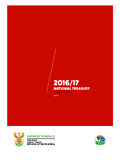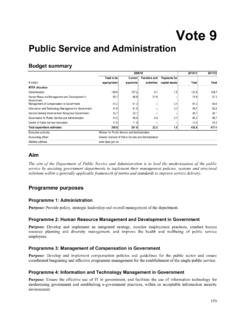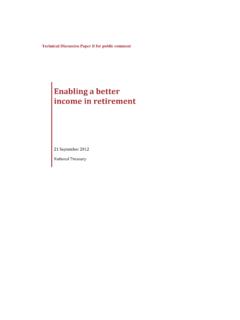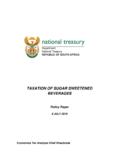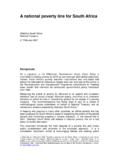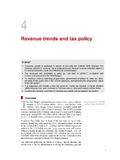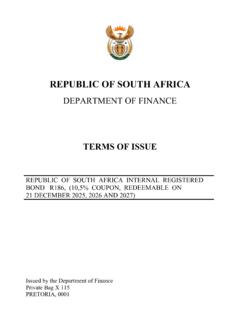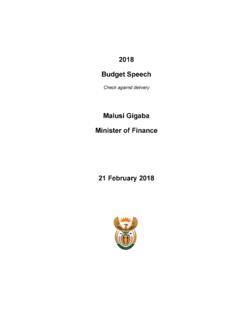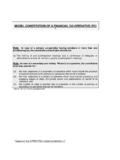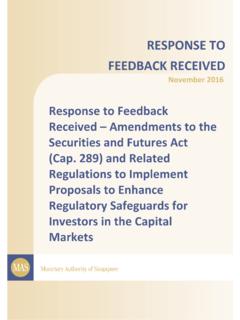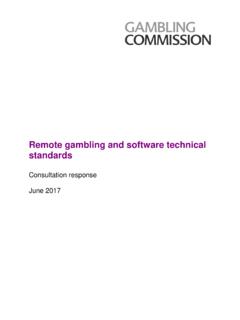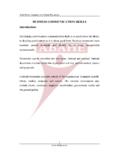Transcription of RESPONSE TO KEY ISSUES - National Treasury
1 RESPONSE TO KEY ISSUES RESPONSE to key ISSUES raised in public comments on the draft Regulations under the Long-term Insurance Act, 1998 and Short-term Insurance Act, 1998 published in December 2016 for public comment 2017 This document must be read in conjunction with the following documents published together with the final Regulations: o Responses to comments on Long-term Insurance Act, 1998: Proposed amendment of Regulations made under section 72 o Responses to comments on Short-term Insurance Act, 1998: Proposed amendment of Regulations made under section 70 RESPONSES TO KEY ISSUES : RESPONSE to key ISSUES raised in public comments on the draft Regulations under the Long-term Insurance Act, 1998 and Short-term Insurance Act, 1998 published in December 2016 for public comment Page 2 of 16 TABLE OF CONTENTS 1.
2 BACKGROUND AND PROCESS .. 3 2. RESPONSE TO CHANGES ISSUES .. 4 Definition of services as intermediary .. 4 Definition of representative .. 4 Equivalence of reward (LTI Act Regulations) .. 6 Commission on credit life schemes (LTI Act Regulations) .. 6 Replacement of risk policies (LTI Act Regulations) .. 7 Policy data administration services .. 8 Binder Regulations .. 9 General principles for determining remuneration .. 14 Remuneration payable by policyholder to independent intermediary (STI Act Regulations) .. 15 Part 4 Limitation on provisions of certain policies (LTI Act Regulations) .. 16 Part 5 Causal events (LTI Act Regulations) .. 16 3. CLOSING .. 16 RESPONSES TO KEY ISSUES : RESPONSE to key ISSUES raised in public comments on the draft Regulations under the Long-term Insurance Act, 1998 and Short-term Insurance Act, 1998 published in December 2016 for public comment Page 3 of 16 1.
3 BACKGROUND AND PROCESS On 23 December 2016, National Treasury (NT) with the support of the Financial Services Board (FSB) published for public comment the proposed amendments to the Regulations made under the Long-term Insurance Act, 1998 ( LTI Act ) and the Short-term Insurance Act, 1998 ( STI Act ) ( draft Regulations ) to give effect to a number of conduct of business reforms. These include reforms mooted in the Retail Distribution Review ( RDR ), specifically the Status Update: RDR Phase 1 published on 10 November 2015, and the draft amendments to the Binder Regulations published on 11 July 2014 for public comment until 1 September 2014, the finalisation of which was deferred until the publication of the detailed RDR Phase 1 proposals.
4 During the course of February 2017, the NT with the support of the FSB hosted industry workshops with the purpose of positioning the changes proposed in the draft Regulations. The due date for submission of comments was 22 February 2017 but an extension was granted to a number of commentators to 22 March 2017. A total of 40 commentators provided feedback on the draft Regulations through the formal consultation process. The NT in conjunction with the FSB undertook a comprehensive review of all comments received. Most comments focused on the proposed introduction of binder fee caps for financial advisers. During May and June 2017 the FSB engaged with the commentators that had made the most detailed submissions (South African Insurance Association (SAIA), Association for Savings and Investment South Africa (ASISA), Financial Intermediaries Association (FIA) and South African Underwriters Association (SAUMA)).
5 These engagements were aimed at better understanding their comments and at making an informed decision on what would constitute reasonable and commensurate remuneration for the performance of binder functions and related activities, so as to mitigate any risk of the remuneration potentially resulting in conflicted advice. Subsequently the FSB, with the endorsement of the NT, invited all commentators to attend a workshop on 21 July 2017 with the purpose of presenting and discussing the revised position on the proposed Regulations. After the workshop, on 24 July 2017, revised proposals were circulated to all commentators for comment. Subsequently the FSB submitted its formal inputs on the draft Regulations, as informed by these engagements, to the NT.
6 Following the above process the NT made several changes to the draft Regulations. These changes were based on the comments received through the formal consultation process, further technical and non-technical inputs received from the main commentators and industry participants and the FSB s formal inputs. The purpose of this document is to explain the most significant changes that were made to the draft Regulations, to provide reasons why certain changes requested by commentators have not been made, and to position the rationale that informed the final Regulations. RESPONSES TO KEY ISSUES : RESPONSE to key ISSUES raised in public comments on the draft Regulations under the Long-term Insurance Act, 1998 and Short-term Insurance Act, 1998 published in December 2016 for public comment Page 4 of 16 2.
7 RESPONSE TO KEY ISSUES Definition of services as intermediary To ensure a consistent approach is adopted when interpreting the LTI Act and STI Act, it was initially deemed prudent to align the definitions of services as intermediary across the Regulations made under the LTI Act and STI Act through the draft Regulations. These proposed amendments elicited a number of comments, amongst other things that the draft STI Act Regulations extended the definition of services as intermediary to include administrative services which, according to some commentators, did not previously fall within the Services as an intermediary are compensated by commission which is capped in law.
8 It was argued by industry that administrative functions that are outsourced by an insurer to an intermediary currently constitute outsourced services and not intermediary services, and therefore the proposed definition would considerably increase the functions which an intermediary is required to perform without any corresponding compensation (over and above regulated commission) for services rendered. Having considered all comments received and concerns raised, the decision was taken that the definition of services as intermediary under both the LTI Act and STI Act Regulations should not be aligned at this stage2 pending further activity segmentation work to be done during later RDR phases to ensure that a comprehensive and holistic approach to remuneration is adopted.
9 However, the NT and FSB remain of the view that the existing definition of services as intermediary in both the STI Act3 and LTI Act Regulations is broad and, provided all other elements of the definition are satisfied, includes both administrative type services and the provision of advice. Definition of representative LTI Act Regulations The draft Regulations proposed an amendment to the definition of representative in the LTI Act Regulations to give effect to Proposal V of RDR. The current mechanism whereby insurers enter into arrangements to allow their representatives to provide services on one another s policies (enabled by the existing definition of representative ) is one of the key regulatory mechanisms underpinning hybrid advice models.
10 These hybrid models result in distribution models that undermine the customer s ability to appreciate the capacity in which advice is provided and any potential conflicts of interest. It also creates an un-level playing field between representatives and independent intermediaries as the current 1 Specifically under the STI Act Regulations. 2 Therefore, no amendment to the definition of services as intermediary is reflected in the final Regulations. 3 As communicated in Note 1 under Part IV to the Explanatory document supporting the December 2016 consultation on the amendments to the Regulation, the Financial Services Laws General Amendment Act, 2013 repealed the definitions of services as intermediary , representative and independent intermediary in the STI Act, but the repeal has not yet been made effective.
